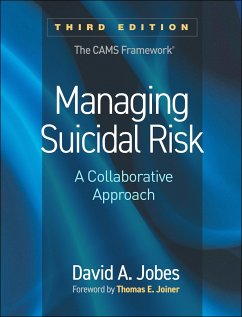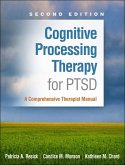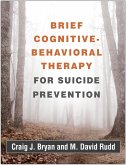- Gebundenes Buch
- Merkliste
- Auf die Merkliste
- Bewerten Bewerten
- Teilen
- Produkt teilen
- Produkterinnerung
- Produkterinnerung
Now in an extensively revised third edition with 65% new material, this is the authoritative presentation of the Collaborative Assessment and Management of Suicidality (CAMS) therapeutic framework.
Andere Kunden interessierten sich auch für
![Suicidology Suicidology]() Ronald W MarisSuicidology99,99 €
Ronald W MarisSuicidology99,99 €![Cognitive Processing Therapy for PTSD Cognitive Processing Therapy for PTSD]() Patricia A ResickCognitive Processing Therapy for PTSD90,99 €
Patricia A ResickCognitive Processing Therapy for PTSD90,99 €![Military Stress Reactions Military Stress Reactions]() Carrie H KennedyMilitary Stress Reactions53,99 €
Carrie H KennedyMilitary Stress Reactions53,99 €![Brief Cognitive-Behavioral Therapy for Suicide Prevention Brief Cognitive-Behavioral Therapy for Suicide Prevention]() Craig J BryanBrief Cognitive-Behavioral Therapy for Suicide Prevention81,99 €
Craig J BryanBrief Cognitive-Behavioral Therapy for Suicide Prevention81,99 €![Effective Treatments for Ptsd Effective Treatments for Ptsd]() Effective Treatments for Ptsd115,99 €
Effective Treatments for Ptsd115,99 €![The Suicidal Patient: Clinical and Legal Standards of Care The Suicidal Patient: Clinical and Legal Standards of Care]() Bruce BongarThe Suicidal Patient: Clinical and Legal Standards of Care66,99 €
Bruce BongarThe Suicidal Patient: Clinical and Legal Standards of Care66,99 €![Autopsy of a Suicidal Mind Autopsy of a Suicidal Mind]() Edwin S ShneidmanAutopsy of a Suicidal Mind58,99 €
Edwin S ShneidmanAutopsy of a Suicidal Mind58,99 €-
-
-
Now in an extensively revised third edition with 65% new material, this is the authoritative presentation of the Collaborative Assessment and Management of Suicidality (CAMS) therapeutic framework.
Hinweis: Dieser Artikel kann nur an eine deutsche Lieferadresse ausgeliefert werden.
Hinweis: Dieser Artikel kann nur an eine deutsche Lieferadresse ausgeliefert werden.
Produktdetails
- Produktdetails
- Verlag: Guilford Publications
- 3rd edition
- Seitenzahl: 362
- Erscheinungstermin: 21. August 2023
- Englisch
- Abmessung: 276mm x 204mm x 26mm
- Gewicht: 1021g
- ISBN-13: 9781462552702
- ISBN-10: 1462552706
- Artikelnr.: 67618738
- Herstellerkennzeichnung
- Libri GmbH
- Europaallee 1
- 36244 Bad Hersfeld
- gpsr@libri.de
- Verlag: Guilford Publications
- 3rd edition
- Seitenzahl: 362
- Erscheinungstermin: 21. August 2023
- Englisch
- Abmessung: 276mm x 204mm x 26mm
- Gewicht: 1021g
- ISBN-13: 9781462552702
- ISBN-10: 1462552706
- Artikelnr.: 67618738
- Herstellerkennzeichnung
- Libri GmbH
- Europaallee 1
- 36244 Bad Hersfeld
- gpsr@libri.de
David A. Jobes, PhD, ABPP, is Professor of Psychology, Associate Director of Clinical Training, and Director of the Suicide Prevention Laboratory at The Catholic University of America. He is also Adjunct Professor of Psychiatry in the School of Medicine at the Uniformed Services University. With research interests in suicidology for over 40 years, he has published extensively in the field and routinely conducts professional training in clinical suicidology, professional ethics, and risk management. Dr. Jobes has served as a consultant to the Department of Defense, the Department of Veterans Affairs, the Centers for Disease Control and Prevention, the National Institute of Mental Health, the National Academy of Medicine, and the U.S. Army Intelligence and Security Command. A past president of the American Association of Suicidology (AAS), he is a member of the Board of Directors of the American Foundation for Suicide Prevention (AFSP), serves on AFSP's Scientific Council, and is Chair of the AFSP Public Policy Council. His work has been recognized by the Edwin S. Shneidman Award for early career contribution to suicidology, the Louis I. Dublin Award for career contribution to suicidology, and the Marsha M. Linehan Award for outstanding research in the treatment of suicide risk from AAS. He is also the recipient of the 2022 Alfred M. Wellner Award for Lifetime Achievement (for research) from the National Register of Health Service Psychologists. Dr. Jobes is a Fellow of the American Psychological Association and is board certified in clinical psychology. He maintains a private clinical, consulting, and forensic practice in Maryland and Washington, DC.
Foreword, Thomas E. Joiner
1. The Collaborative Assessment and Management of Suicidality
2. The Suicide Status Form
3. Optimizing the Use of the CAMS Framework
4. CAMS Risk Assessment
5. CAMS Treatment Planning
6. CAMS Interim Care
7. CAMS Clinical Outcomes and Disposition
8. CAMS as a Means of Decreasing Malpractice Liability
9. CAMS Adaptations and Future Developments
Epilogue
Appendix A. Contemporary Mental Health Care Developments Related to Suicide
Prevention
Appendix B. Suicide Status Form-5 (SSF-5): First Session, Interim Sessions,
Final Session
Appendix C. Coding Manual for the SSF Core Assessment Scales: Qualitative
Assessment
Appendix D. Coding Manual for SSF Reasons for Living versus Reasons for
Dying
Appendix E. Coding Manual for the SSF One-Thing Response
Appendix F. CAMS-Related Empirical Research
Appendix G. CAMS Quick Check Preparation Guide
Appendix H. CAMS Therapeutic Worksheet
Appendix I. Stabilization Support Plan
Appendix J. Complete CAMS Case Example of Carmen
Appendix K. CAMS Living Status Form
Appendix L. CAMS Rating Scale (CRS.3)
Appendix M. Frequently Asked Questions about CAMS
References
Index
1. The Collaborative Assessment and Management of Suicidality
2. The Suicide Status Form
3. Optimizing the Use of the CAMS Framework
4. CAMS Risk Assessment
5. CAMS Treatment Planning
6. CAMS Interim Care
7. CAMS Clinical Outcomes and Disposition
8. CAMS as a Means of Decreasing Malpractice Liability
9. CAMS Adaptations and Future Developments
Epilogue
Appendix A. Contemporary Mental Health Care Developments Related to Suicide
Prevention
Appendix B. Suicide Status Form-5 (SSF-5): First Session, Interim Sessions,
Final Session
Appendix C. Coding Manual for the SSF Core Assessment Scales: Qualitative
Assessment
Appendix D. Coding Manual for SSF Reasons for Living versus Reasons for
Dying
Appendix E. Coding Manual for the SSF One-Thing Response
Appendix F. CAMS-Related Empirical Research
Appendix G. CAMS Quick Check Preparation Guide
Appendix H. CAMS Therapeutic Worksheet
Appendix I. Stabilization Support Plan
Appendix J. Complete CAMS Case Example of Carmen
Appendix K. CAMS Living Status Form
Appendix L. CAMS Rating Scale (CRS.3)
Appendix M. Frequently Asked Questions about CAMS
References
Index
Foreword, Thomas E. Joiner
1. The Collaborative Assessment and Management of Suicidality
2. The Suicide Status Form
3. Optimizing the Use of the CAMS Framework
4. CAMS Risk Assessment
5. CAMS Treatment Planning
6. CAMS Interim Care
7. CAMS Clinical Outcomes and Disposition
8. CAMS as a Means of Decreasing Malpractice Liability
9. CAMS Adaptations and Future Developments
Epilogue
Appendix A. Contemporary Mental Health Care Developments Related to Suicide
Prevention
Appendix B. Suicide Status Form-5 (SSF-5): First Session, Interim Sessions,
Final Session
Appendix C. Coding Manual for the SSF Core Assessment Scales: Qualitative
Assessment
Appendix D. Coding Manual for SSF Reasons for Living versus Reasons for
Dying
Appendix E. Coding Manual for the SSF One-Thing Response
Appendix F. CAMS-Related Empirical Research
Appendix G. CAMS Quick Check Preparation Guide
Appendix H. CAMS Therapeutic Worksheet
Appendix I. Stabilization Support Plan
Appendix J. Complete CAMS Case Example of Carmen
Appendix K. CAMS Living Status Form
Appendix L. CAMS Rating Scale (CRS.3)
Appendix M. Frequently Asked Questions about CAMS
References
Index
1. The Collaborative Assessment and Management of Suicidality
2. The Suicide Status Form
3. Optimizing the Use of the CAMS Framework
4. CAMS Risk Assessment
5. CAMS Treatment Planning
6. CAMS Interim Care
7. CAMS Clinical Outcomes and Disposition
8. CAMS as a Means of Decreasing Malpractice Liability
9. CAMS Adaptations and Future Developments
Epilogue
Appendix A. Contemporary Mental Health Care Developments Related to Suicide
Prevention
Appendix B. Suicide Status Form-5 (SSF-5): First Session, Interim Sessions,
Final Session
Appendix C. Coding Manual for the SSF Core Assessment Scales: Qualitative
Assessment
Appendix D. Coding Manual for SSF Reasons for Living versus Reasons for
Dying
Appendix E. Coding Manual for the SSF One-Thing Response
Appendix F. CAMS-Related Empirical Research
Appendix G. CAMS Quick Check Preparation Guide
Appendix H. CAMS Therapeutic Worksheet
Appendix I. Stabilization Support Plan
Appendix J. Complete CAMS Case Example of Carmen
Appendix K. CAMS Living Status Form
Appendix L. CAMS Rating Scale (CRS.3)
Appendix M. Frequently Asked Questions about CAMS
References
Index








